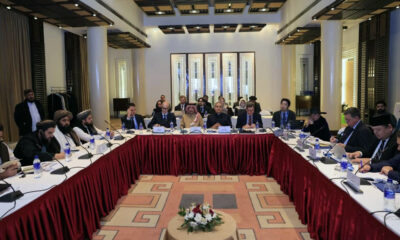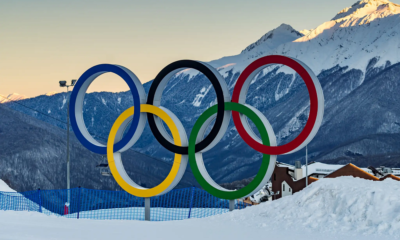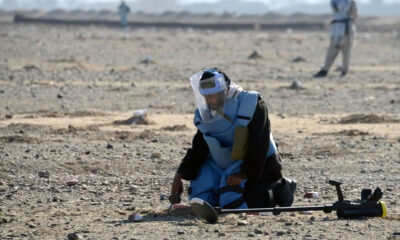World
German Social Democrats beat conservatives in vote to decide Merkel successor

Germany’s Social Democrats narrowly won Sunday’s national election, projected results showed, and claimed a “clear mandate” to lead a government for the first time since 2005 and to end 16 years of conservative-led rule under Angela Merkel.
The centre-left Social Democrats (SPD) were on track for 26.0% of the vote, ahead of 24.5% for Merkel’s CDU/CSU conservative bloc, projections for broadcaster ZDF showed, but both groups believed they could lead the next government.
With neither major bloc commanding a majority, and both reluctant to repeat their awkward “grand coalition” of the past four years, the most likely outcome is a three-way alliance led by either the Social Democrats or Merkel’s conservatives.
Agreeing a new coalition could take months, and will likely involve the smaller Greens and liberal Free Democrats (FDP).
“We are ahead in all the surveys now,” the Social Democrats’ chancellor candidate, Olaf Scholz, said in a round table discussion with other candidates after the vote.
“It is an encouraging message and a clear mandate to make sure that we get a good, pragmatic government for Germany,” he added after earlier addressing jubilant SPD supporters.
The SPD’s rise heralds a swing left for Germany and marks a remarkable comeback for the party, which has recovered some 10 points in support in just three months to improve on its 20.5% result in the 2017 national election.
Scholz, 63, would become the fourth post-war SPD chancellor after Willy Brandt, Helmut Schmidt and Gerhard Schroeder. Finance minister in Merkel’s cabinet, he is a former mayor of Hamburg.
Scholz’s conservative rival Armin Laschet, signalled his bloc was not ready yet to concede, though his supporters were subdued.
“It hasn’t always been the first-placed party that provided the chancellor,” Laschet, 60, told the round table. “I want a government where every partner is involved, where everyone is visible – not one where only the chancellor gets to shine,” he said in an early attempt to woo smaller parties.
Schmidt ruled in the late 1970s and early 1980s in coalition with the FDP even though his Social Democrats had fewer parliamentary seats than the conservative bloc.
Attention will now shift to informal discussions followed by more formal coalition negotiations, which could take months, leaving Merkel in charge in a caretaker role.
Scholz and Laschet both said they would aim to strike a coalition deal before Christmas.
Merkel plans to step down after the election, making the vote an era-changing event to set the future course of Europe’s largest economy.
She has stood large on the European stage almost since taking office in 2005 – when George W. Bush was U.S. president, Jacques Chirac in the Elysee Palace in Paris and Tony Blair British prime minister.
After a domestic-focused election campaign, Berlin’s allies in Europe and beyond may have to wait for months before they can see whether the new German government is ready to engage on foreign issues to the extent they would like.
A row between Washington and Paris over a deal for Australia to buy U.S. instead of French submarines has put Germany in an awkward spot between allies, but also gives Berlin the chance to help heal relations and rethink their common stance on China.
On hearing that the SPD were slightly ahead in polls, U.S. President Joe Biden told reporters in Washington: “I’ll be darned… They’re solid.”
On economic policy, French President Emmanuel Macron is eager to forge a common European fiscal policy, which the Greens support but the CDU/CSU and FDP reject. The Greens also want “a massive expansion offensive for renewables”.
“Germany will end up with a rather weak chancellor who will struggle to get behind any kind of ambitious fiscal reform at the EU level,” said Naz Masraff at political risk consultancy Eurasia.
Whatever coalition ends up in power, Germany’s friends can at least take heart that moderate centrism has prevailed, and the populism that has taken hold in other European countries failed to break through.
The projected results for ZDF showed the far-right Alternative for Germany (AfD) on track for 10.5%, worse than four years ago when they stormed into the national parliament with 12.6% of the vote, and with all mainstream groupings ruling out a coalition with the party.
World
US shoots down Iranian drone approaching aircraft carrier, official says
Iran’s Tasnim news agency said connection had been lost with a drone in international waters, but the reason was unknown.

The U.S. military on Tuesday shot down an Iranian drone that “aggressively” approached the Abraham Lincoln aircraft carrier in the Arabian Sea, the U.S. military said, in an incident first reported by Reuters.
The incident came as diplomats sought to arrange nuclear talks between Iran and the United States, and U.S. President Donald Trump warned that with U.S. warships heading toward Iran, “bad things” would probably happen if a deal could not be reached.
Oil futures prices rose more than $1 per barrel after news the drone was shot down.
The Iranian Shahed-139 drone was flying toward the carrier “with unclear intent” and was shot down by an F-35 U.S. fighter jet, the U.S. military said.
“An F-35C fighter jet from Abraham Lincoln shot down the Iranian drone in self-defense and to protect the aircraft carrier and personnel on board,” said Navy Captain Tim Hawkins, a spokesperson at the U.S. military’s Central Command.
Iran’s U.N. mission declined to comment.
Iran’s Tasnim news agency said connection had been lost with a drone in international waters, but the reason was unknown.
No American service members were harmed during the incident and no U.S. equipment was damaged, he added.
The Lincoln carrier strike group is the most visible part of a U.S. military buildup in the Middle East following a violent crackdown against anti-government demonstrations last month, the deadliest domestic unrest in Iran since its 1979 revolution.
Trump, who stopped short of carrying out threats to intervene during the crackdown, has since demanded Tehran make nuclear concessions and sent a flotilla to its coast. He said last week Iran was “seriously talking,” while Tehran’s top security official, Ali Larijani, said arrangements for negotiations were under way.
In a separate incident on Tuesday in the Strait of Hormuz, just hours after the drone shootdown, Iran’s Islamic Revolutionary Guard Corps forces harassed a U.S.-flagged, U.S.-crewed merchant vessel, according to the U.S. military.
“Two IRGC boats and an Iranian Mohajer drone approached M/V Stena Imperative at high speeds and threatened to board and seize the tanker,” Hawkins said.
Maritime risk management group Vanguard said the Iranian boats ordered the tanker to stop its engine and prepare to be boarded. Instead, the tanker sped up and continued its voyage.
Hawkins said a U.S. Navy warship, the McFaul, was operating in the area and escorted the Stena Imperative, Reuters reported.
“The situation de-escalated as a result, and the U.S.-flagged tanker is proceeding safely,” Hawkins added.
World
Top US, Israeli generals meet at Pentagon amid soaring Iran tensions
The officials did not offer details about the closed-door discussions between U.S. General Dan Caine, the chairman of the Joint Chiefs of Staff, and Eyal Zamir, the Israeli armed forces chief of staff.

The top U.S. and Israeli generals held talks at the Pentagon on Friday amid soaring tensions with Iran, two U.S. officials told Reuters on Sunday, speaking on condition of anonymity, Reuters reported.
The officials did not offer details about the closed-door discussions between U.S. General Dan Caine, the chairman of the Joint Chiefs of Staff, and Eyal Zamir, the Israeli armed forces chief of staff. The meeting has not been previously reported.
The United States has ramped up its naval presence and hiked its air defences in the Middle East after President Donald Trump repeatedly threatened Iran, trying to pressure it to the negotiating table. Iran’s leadership warned on Sunday of a regional conflict if the U.S. were to attack it, read the report.
Israeli Defence Minister Israel Katz on Sunday met with Zamir after his talks in Washington, Katz’s office said, to review the situation in the region and the Israeli military’s “operational readiness for any possible scenario.”
World
Israeli attacks kill 31 Palestinians in Gaza, including children
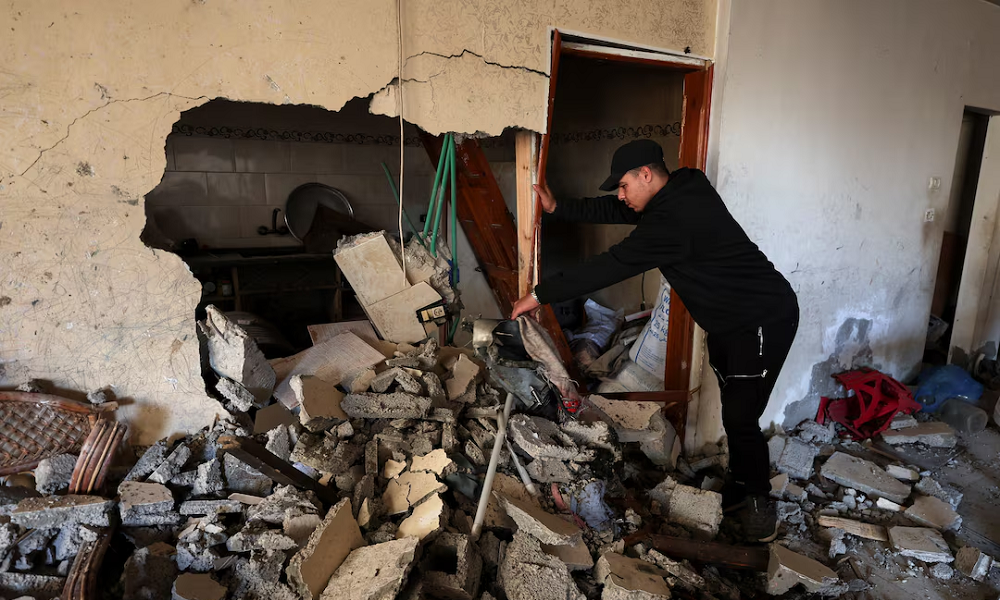
At least 31 Palestinians, including six children, were killed in Israeli attacks on Gaza City and Khan Younis since early Saturday, according to medical sources cited by Al Jazeera.
The strikes came a day before Israel is scheduled to reopen the Rafah crossing between Gaza and Egypt on Sunday, marking the first reopening of the border crossing since May 2024.
Gaza’s Government Media Office said that more than 500 Palestinians have been killed by Israeli forces since a United States-brokered ceasefire came into effect on October 10.
According to local health authorities, Israel’s military campaign in Gaza has killed at least 71,769 Palestinians and wounded 171,483 others since it began in October 2023. In Israel, at least 1,139 people were killed during the Hamas-led attacks on October 7, 2023, with approximately 250 people taken captive.
-

 Sport4 days ago
Sport4 days agoAFC Futsal Asian Cup: Afghanistan to face Iran in crucial Group D clash
-

 Sport5 days ago
Sport5 days agoT20 World Cup 2026: Afghanistan national cricket team arrives in India
-

 Sport3 days ago
Sport3 days agoAFC Futsal Asian Cup 2026: Final eight confirmed
-
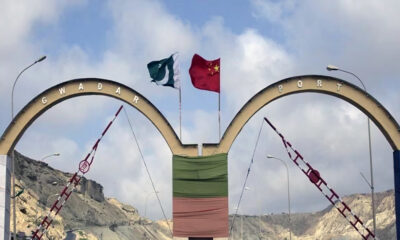
 Business5 days ago
Business5 days agoPakistan, China plan to extend CPEC to Afghanistan, revive trilateral framework
-

 Latest News4 days ago
Latest News4 days agoAfghanistan granted 30,000 Hajj quota for 2026
-

 Sport3 days ago
Sport3 days agoAfghanistan in new kit for T20 World Cup warm-up against Scotland
-

 Sport3 days ago
Sport3 days agoIran see off spirited Afghanistan to finish top of Group D
-

 Sport2 days ago
Sport2 days agoJapan trumps Afghanistan 6-0 in AFC Futsal Asian Cup quarter-final




